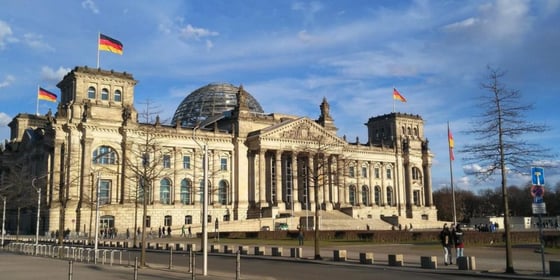German Political System

Contents
When you move to Germany, getting to grips with how politics works is absolutely essential, especially for those who choose to become German citizens, but even foreign students need a little grounding in how power operates. German residents need to access state services like health insurance, employment exchanges, and universities, and the laws made in Berlin affect everyone's lives.
With that in mind, this article provides a short overview of how the system works, what key terms mean, and who holds power right now.
The German government and political structure
Let's start off with some structural basics
Every democracy consists of a framework of institutions, all with their separate roles. And each one has its own quirks. Here's how Germany compares to other systems around the world.
What is the political system of Germany?
Germany is a Federal democracy, with strong political parties, an independent judiciary, and powerful regional and local governments. As such, things can get a little confusing - even for native citizens.
The "Federal" part refers to the way that power is divided nationally. Institutions in Berlin have certain Federal powers, which reach across regional boundaries. For instance, Berlin mandates rules regarding health insurance.
On the other hand, many powers are reserved for regional assemblies or local authorities. This helps to prevent power accumulating in the center - potentially threatening the health of German democracy.
What role does the German Constitution play?
Germany is also a constitutional democracy. This means that the framework of rules which determines where power lies, and how people are elected, is described by a core document. Any changes to this document must be made with careful attention to their wider implications.
The constitution itself was passed in 1949 and is known as the Grundgesetz für die Bundesrepublik Deutschland (or Basic Law). Unlike some constitutions, it has regularly been reshaped to suit changing situations and is regarded as one of the most flexible of its kind in the world.
How does German voting work?
Just as in every democracy, voting is the most important German political right, and non-citizens are generally not able to vote in most elections. There are exceptions. For instance, EU nationals can vote in local and European elections.
However, elections to the Federal chambers are limited to German citizens. The voting age in Germany is 18 (16 for local elections), and all adult citizens can vote. The most important elections take place every 4 years and elect representatives to the Bundestag (essentially the national assembly).
In these elections, voters cast two votes. The first is for a specific candidate, who needs to earn the most votes in each electoral district to be elected. The other vote is for a "party list". These votes are used to make sure that parties receive approximately as many seats as their percentage of the vote.
Who is Germany’s head of government?
You might be wondering where power really lies in Germany, and it can be hard for outsiders to understand the political landscape. On the face of it, you might look to the "Head of State" - in this case, the German President. But appearances can be deceptive.
Who has the political power in Germany?
One source of confusion can be dealt with straight away, the head of state isn't the most powerful person in German politics. Instead, the President has a mainly ceremonial role (except in very unusual circumstances). The head of government is actually the Chancellor, who runs the largest political party in Germany's Bundestag.
German political parties
As the party list system suggests, German democracy is based around political parties - organizations set up to follow common sets of principles, and synchronize their efforts in the various political institutions.
These are the major political players right now:
- Christian Democrats: Located on the center-right, the CPD has been Germany's most electorally successful party. Founded in 1945 by a coalition of anti-Nazi groups and conservatives, the party brings together Protestants and Catholics, and generally follows pro-market, socially conservative policies. Famous figures include Angela Merkel (the current Chancellor), Helmut Kohl, and Konrad Adenauer.
- Social Democrats (SPD): The SPD is Germany's oldest party, and thought of as its second largest. Founded in 1863, the party was once Marxist-influenced but has become more moderate in the past 50 years. Nowadays, it lies in the center ground and tends to propose social protections for workers, greater environmental regulation, and socially liberal policies.
- Greens: Germany has one of the most successful Green parties in the world. Greens like Joschka Fischer have served as Foreign Minister, pushing Germany towards support for peace and pro-renewable policies.
- Free Democrats (FDP): Positioned to the right of the CDP economically, but socially very liberal, the FDP is hard to place in German politics. Headed by Christian Lindner, and founded in 1948, it regularly wins 7-8% in elections.
- Die Linke: Created in 2007 by left-wing dissidents in the SDP, Die Linke is a left-wing party that draws inspiration from anti-capitalist thinkers. Successful in the post-Communist East, it holds over 60 Bundestag seats.
- Alternative for Germany (AFD): Highly controversial, AFD is a right-wing nationalist party that seeks to reduce immigration and occupies anti-Islam positions. It has few allies in other parties, which tend to work to reduce its growth and influence.
Volunteering during political campaigns
If you want to learn more about how parties work, why not volunteer during political campaigns? Non-citizens can volunteer, and parties will generally be happy to receive any assistance.
Which political party is in power in Germany?
While there are plenty of parties contesting for seats, CPD and SPD have been the major parties of government for the past 70 years. However, there have been many coalitions, which involve larger parties forming alliances with smaller parties. In recent times, things have become even more complex, with the creation of a "Grand Coalition" between the SPD and CPD following the 2008 financial crisis.
At present, Angela Merkel presides over a coalition with the Bavarian Christian Social Union and the SPD. This means that Merkel's party has the right to propose most policies, but her coalition partners wield significant influence.
Bundesrat and Bundestag in Germany
Nationally, two major institutions dominate the German political scene, and it definitely helps to understand how they differ
What is the difference between Bundesrat and Bundestag?
The Bundesrat is the "second chamber". Unlike the Bundestag, its 69 members are not elected. Instead, they are recommended by provincial governments, and tend to reflect the national vote tallies of the major parties. Designed to provide a check on executive power, the second chamber must agree all legislation tabled by the Bundestag, and also acts as a champion of regional powers.
If federal laws infringe on regional powers, the Bundesrat is tasked with registering dissent and blocking those laws. Importantly, the chamber can also veto changes to the German constitution - a hugely important check on the Bundestag's power.
By contrast, the Bundestag is fully elected and much more powerful. Members of the Bundestag form German governments, propose legislation, schedule budgets, and vote on foreign policy issues such as declarations of war.
How is the German chancellor elected?
The Bundestag elects the Chancellor, meaning that candidates must command a majority of representatives. When elections take place, the composition of the Bundestag will generally change.
If the current Chancellor retains their majority, they are free to form another government. If not, anyone with enough votes to pass legislation can be named Chancellor with the President's approval. Votes for Chancellor are always secret, and there is no direct component (unlike in countries like the USA).
What is the role of the German president?
As the Head of State, the German president is the figurehead of democracy and the guardian of the constitution. They must agree the laws and the election of Chancellors, but in practice have very few concrete powers. Presidents are not elected. Instead, they are chosen (in a process like the selection of a Pope) by a committee of Bundestag members. Presidents must be aged over 40, and they serve a maximum of two five-year terms.
Learning details
Learning details like how German presidents are elected could help you gain citizenship. To become a naturalized German, applicants must pass a 33 question multiple choice test, and German politics and laws are common themes.
The Bundesländer
In Germany, the Federal Constitution seeks to protect regional identities and powers. After the experience of the 20th century, its framers sought to make Germany's democracy more stable and durable than any other. And these aims have mostly been achieved. The Bundesländer (German States) plays a key role in this system.
There are 16 of these regional states, varying in size from Bavaria, with 12 million people, to Bremen, with just 670,000 residents. Each region has the same structure, with a Minister-President presiding over a Landtag. Below that, the political landscape is divided into various sub-regions, including Regierungsbezirke (governmental districts), Kriese (districts), and Gemeinden (municipalities).
Voting
Remember that voting is reserved for German citizens. However, citizenship can be granted after 8 years of residence, so start planning your application soon to have everything ready when the time comes.
Who governs Germany? Center or Regions?
This isn't always an easy question to answer, and it often depends on what powers are being discussed. For example, when it comes to foreign policy, the Chancellor and the Bundestag reign supreme. But this isn't the case for issues like nature conservation, higher education funding, or public health.
Culture is another important area where local governments exercise considerable power, providing subsidies for events and artists. Then there's the question of Europe. Nowadays, EU law takes precedence over German law in many areas, and a certain amount of power resides in Brussels, far from Berlin.
Want to study in Germany?
This might also be of interest to you

Buying Property in Germany as an Expat
Many expats who move to Germany eventually want to stop renting and buy their own place. The good news: in Germany, foreigners are generally allowed...

How to Move to Germany as an American in 2026
Germany is one of the most popular destinations for Americans looking to relocate to Europe. Whether you’re moving for work, education, or simply for...

Driving in Germany
Driving on the right side of the road & tips on how to drive safely in the country. We all know that there is the Autobahn in Germany and that there...

German Supermarkets
Important things to know when buying groceries in Germany If you're new to Germany, you'll soon discover that most local grocery stores have an...

Driving licence in Germany for foreigners
Have you ever wondered how to get a German driver's license at a certified driving school?

German Holidays and Celebrations
Germany enjoys a number of national and regional public holidays and other festivities that take place throughout the year. Those moving to Germany...

German Months
Fundamental to learning any language is becoming familiar with how to talk about days, weeks, months, and years. Mastering how to communicate about...

